Simple Old World Style Pickled Dill Cucumbers Canning Recipe
Views: 187
This beloved family recipe for pickled dill cucumbers comes straight from Grandma’s kitchen in a quaint Ukrainian village. But let’s be real, every family across Eastern Europe had their version of this pickling recipe, ensuring crunchy pickles that were never sweet or soggy. The secret? We keep it simple with natural ingredients, no artificial preservatives, and just the right amount of vinegar and salt.
Pickles to use in this recipe
Do remember, when it comes to pickling, not all cucumbers are suitable for pickling. The long English cucumbers or any other cucumbers that you buy as slicing cucumbers won’t do well when pickled. So, if you like pickles with a nice crunch when you bite into them, you need a certain kind of cucumber. As a rule, you can find these cucumbers labeled “dill cucumbers” or “bread and butter cucumbers” at your local farmers’ markets.
Jars to use
We use 1-liter (32 oz.) Mason jars with a wide mouth. They’re super handy for pickling cucumbers or pretty much anything else. Also, don’t worry if your cucumbers don’t quite fill up the whole 1-liter jar – you can use a half-liter jar (16 oz.) to pickle the remaining cucumbers.
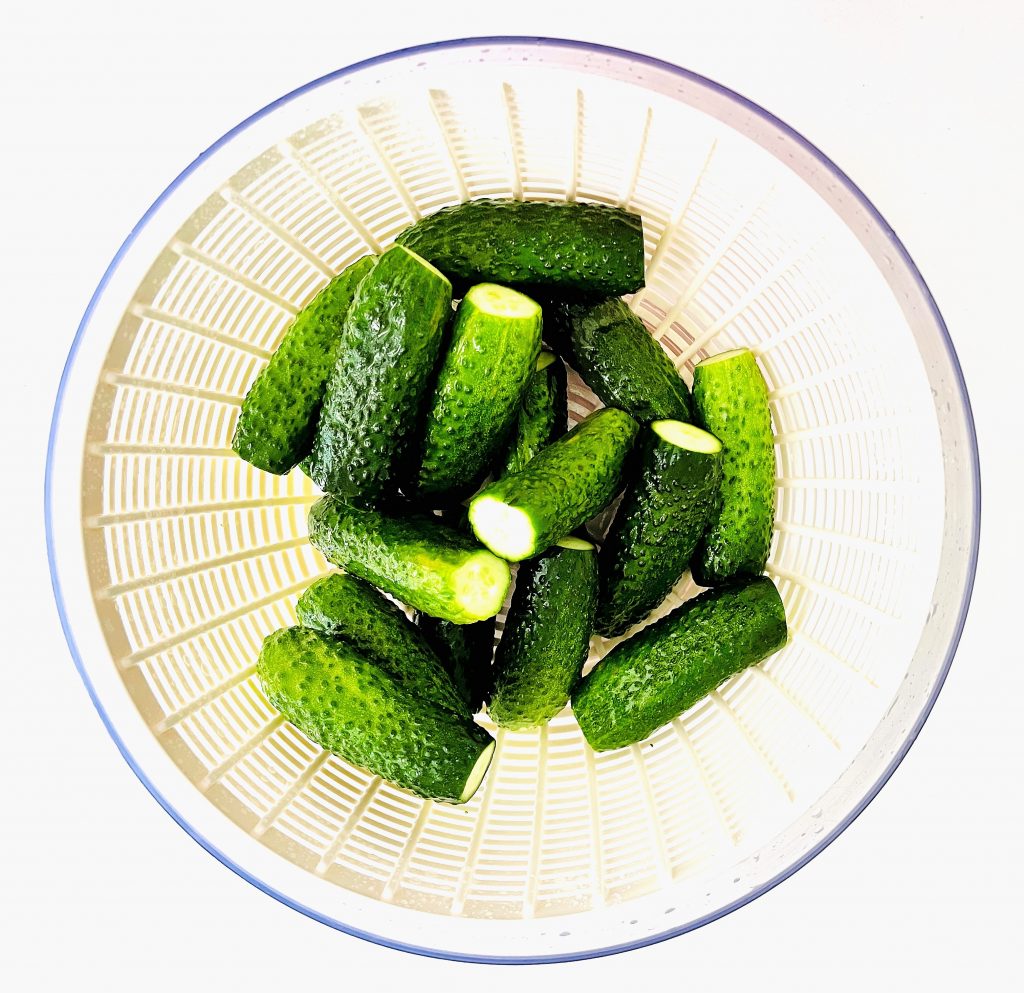
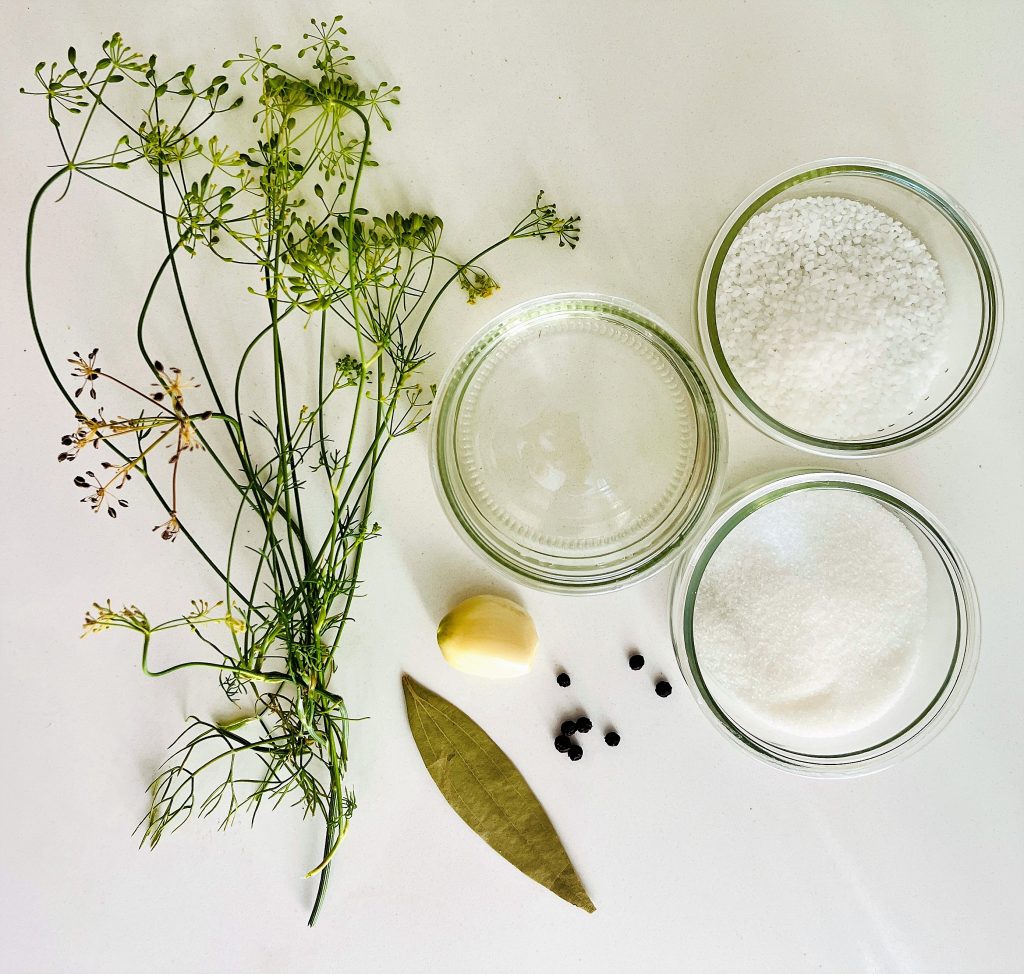
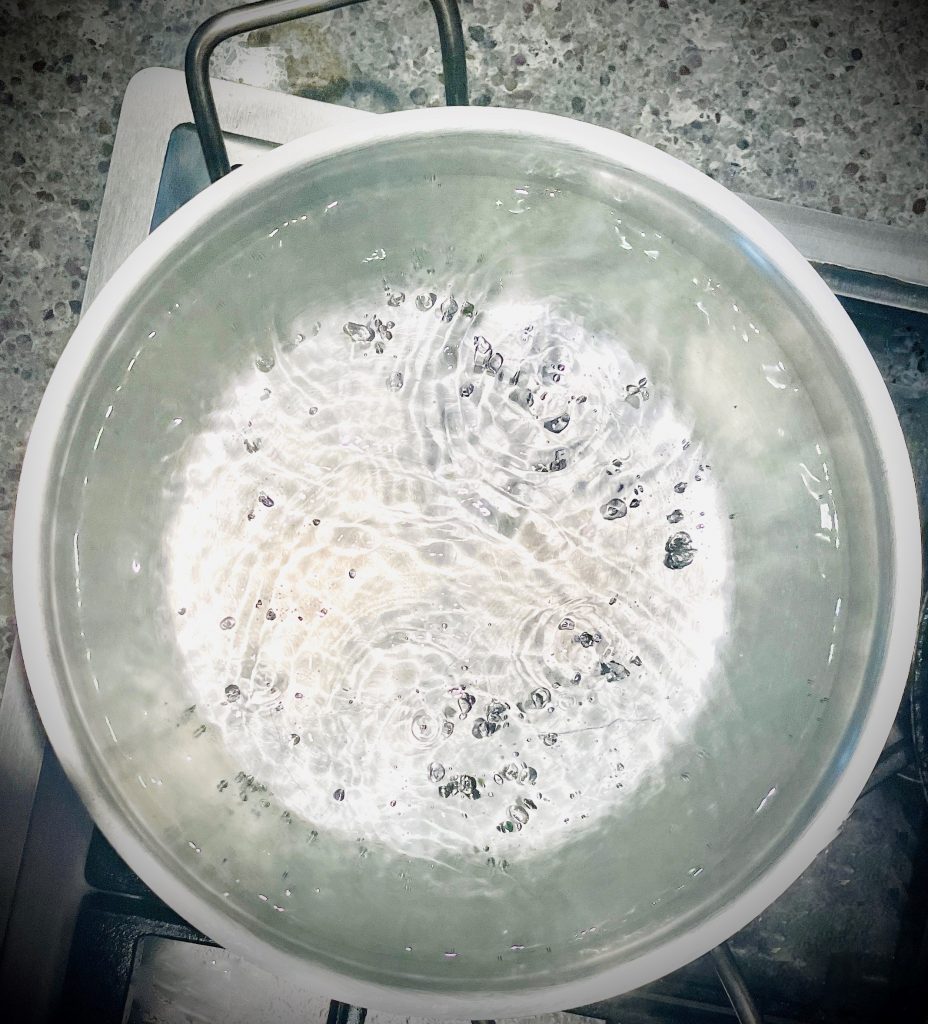
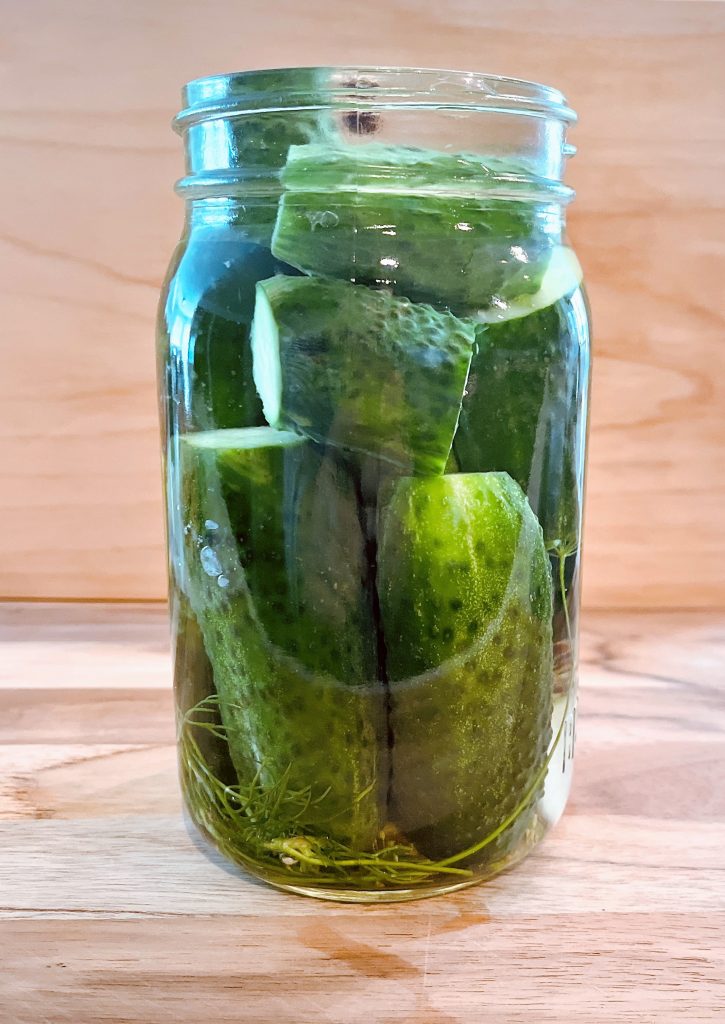
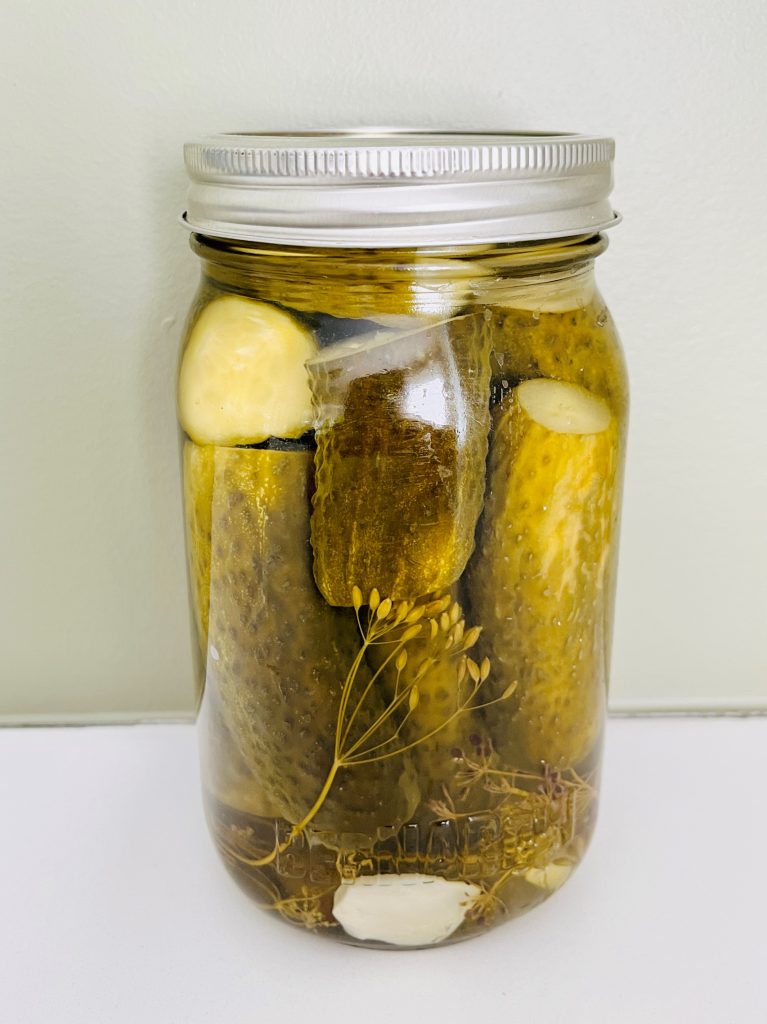
Recommended Equipment
- Wide, heavy-bottomed stainless steel pot
- Large wooden spoon
- Stainless Steel mesh strainer
- Heavy-duty stainless steel kitchen tongs
- Stainless steel pairing knife
- Stainless steel canning ladle
- Stainless steel canning funnel
- Mason Jar lids for canning
- Mason Jars for canning
- Non-slippery trivets and pot holders
- Thick cotton kitchen towel
Easy traditional recipe for canning pickled dill cucumbers
Equipment
- large pot with a heavy bottom
- measuring cup and measuring spoons
- potholders, oven mitts, trivets for hot dishes
- ladle or funnel
Ingredients
- Pickling Cucumbers: 3 pounds 2.5 kg
- *Note: The required amount of marinade (brine) is determined by the number of 32 oz. 1-liter Mason jars used, not the weight of the cucumbers. We made 2 liters of brine for this recipe. (see 'Yeild' below)
Pickling Brine ingredients (per one liter):
- 1 liter 32 oz. water for each 1-liter (32 oz.) jar
- 1 tbsp. pickling salt per 1-liter (32 oz.) jar
- 1 tbsp sugar per 1-liter (32 oz.) jar
- 1 tbsp 7% Pickling vinegar per 1-liter (32 oz.) jar
- 2 garlic cloves per 1-liter (32 oz.) jar
- 1 dill head per 1-liter (32 oz.) jar
- 1 bay leaf per 1-liter (32 oz.) jar
- 6 whole black peppercorns per 1-liter (32 oz.) jar
- 2 slices of horseradish root per 1-liter (32 oz.) jar (optional but highly recommended)
Instructions
- Begin by washing the cucumbers and soaking them in cold water for 2 to 5 hours. Then drain and trim the cucumber tail ends.
- Ensure the mason jars are clean and properly sterilized before starting to pack cucumbers into them.
- Pack the cucumbers tightly into sterilized, cooled jars. Aim to minimize empty space. If necessary, slice cucumbers into halves or quarters. Add dill heads, or you can place them at the bottom or between the cucumbers. Slice garlic cloves into halves or quarters, adding 2 cloves to a 32 oz. jar or 1 clove to a 16 oz. jar. Include peppercorns, bay leaves, and optionally sliced horseradish root. Leave head space at the top of the jars.
- Measure out 1 part cold, clean water for each 1-liter (32 oz.) jar filled with cucumbers. Pour measured out water into a pot and add the measured out salt and sugar.
- Bring water to a boil and continue boiling until the sugar and salt are fully dissolved, about 5 minutes. Just before turning off the heat, add the pickling vinegar. Immediately turn off the heat; this is your pickling marinade, also known as brine.
- Carefully pour the brine into the jars with the pickles, leaving ½-inch headspace. Cover with the lids right away and securely tighten the lid bands.
- The pickles are now ready to be processed in a hot water bath or atmospheric steam canners.
Yield
Processing time guidelines for hot water bath or atmospheric steam canner to preserve your dill pickles
| Jar Size | Altitude | ||
|---|---|---|---|
| 0 – 1,000 ft | 1,001 – 6,000 ft | Above 6,000 ft | |
| Pints (16 oz) | 10 min | 15 min | 20 min |
| Quarts (32 oz) | 15 min | 20 min | 25 min |
Frequently Asked Questions
Can I process these pickled dill cucumbers using open kettle canning or inversion canning methods?
Please note, we adapted this recipe specifically for processing in a water bath canner or atmospheric steam canner. You should not use open kettle canning to make these pickled dill cucumbers because the probability of food spoilage is high. However, if you are interested in an open kettle (inversion canning), we have a recipe for dill pickles specifically adapted for open kettle canning method:
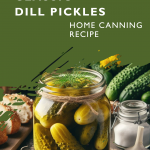

What plant do pickles come from?
Did you know, the top questions people ask on Google are “What plant is a pickle?” and “What plant do pickles come from?” Let’s clear that up. Pickles aren’t from a special plant; they’re cucumbers! A pickle is a cucumber soaked in a mix of water, vinegar, salt, and spices, giving it that tangy or sweet taste.
Are pickled cucumbers pickles?
Yes, pickled cucumbers are commonly referred to as pickles. The process of pickling involves preserving cucumbers in a solution of vinegar, salt, and various spices, giving them a distinctive tangy flavor. So, when cucumbers undergo this pickling process, they become what is commonly known as pickles.
When are pickled cucumbers ready?
Remember, patience is key when it comes to pickled cucumbers! Wait at least a week before digging into your new pickles. For the tastiest results, let them sit for a whole month.
Can pickled cucumbers go bad?
Yes, pickled cucumbers can go bad. While the pickling process helps preserve cucumbers, factors such as improper sealing, contamination, or extended storage can lead to spoilage. Signs of spoilage include a change in color, off-putting odor, or the presence of mold. If you notice any of these signs, it’s best to discard the pickles to avoid the risk of consuming spoiled food. Proper storage and adherence to recommended pickling procedures can help prolong the shelf life of pickled cucumbers.
Can pickled cucumbers go bad after opening?
Once you open a jar of pickled cucumbers their shelf life will be influenced by such factors as exposure to air and contaminants. If stored properly in the refrigerator and kept in an airtight container, opened pickles can last for several weeks, depending on the specific circumstances and ingredients used in the pickling process. However, always check for signs of spoilage, such as an off smell, unusual color, or the presence of mold. If you observe any of these signs, it’s safer to discard the opened pickles to avoid consuming spoiled food.
Can I freeze pickled cucumbers?
We recommend against freezing pickled cucumbers. If frozen, the texture of pickled cucumber will change after thawing, and they will become mushy. This is because the freezing process will affect the crispness of the cucumbers due to the formation of ice crystals.
What pickles the cucumbers?
Pickles are made by soaking cucumbers in a mix of water, vinegar, salt, and spices. This process gives them their unique taste and texture.
Do I need to refrigerate pickled cucumbers?
You can keep unopened pickles in a cool, dark pantry. Once you open a jar of pickles, make sure you refrigerate any pickles leftovers. Always check for signs of spoilage, such as an off smell, unusual color, or the presence of mold, and discard pickles if any of these signs are present.
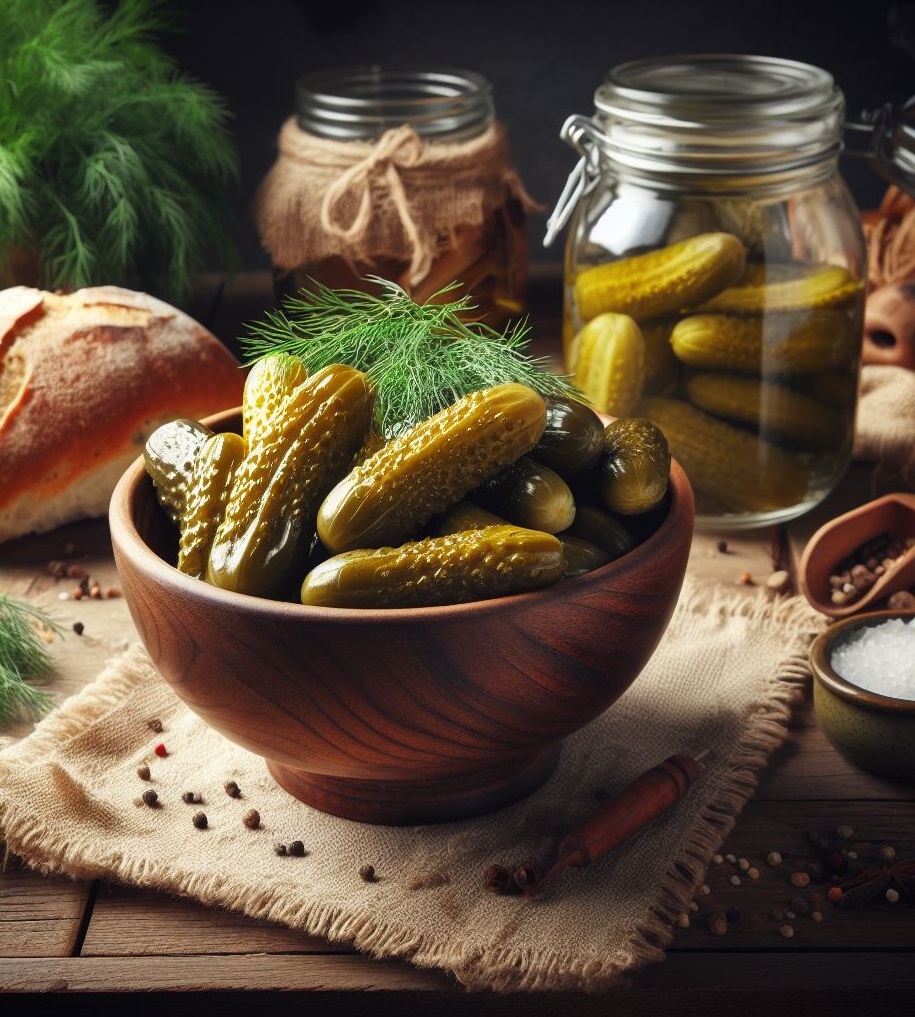
How to use pickled cucumbers?
Here are cool ways to enjoy these dill pickles:
- With Grilled Meats: Serve them as a tangy side to grilled meats for a delicious combo of flavors.
- In Awesome Salads: Jazz up your salads, like Beet Salad, by tossing in these pickles for an extra kick.
- Must-Have for Sauces: They’re a secret weapon for sauces like Sauce Gribiche, Remoulade, and homemade Tartar Sauce.
Whether you’re grilling, tossing salads, or saucing things up, these pickled cucumbers are your go-to for adding that special something to your food.
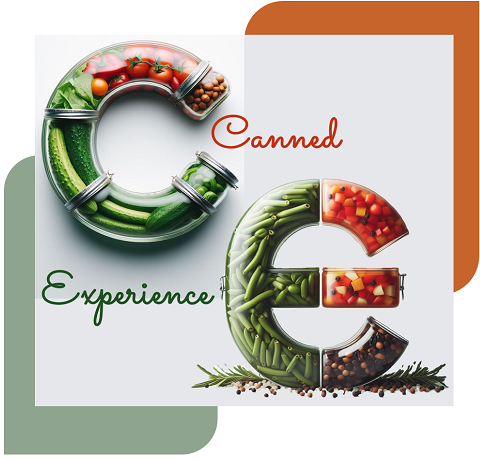
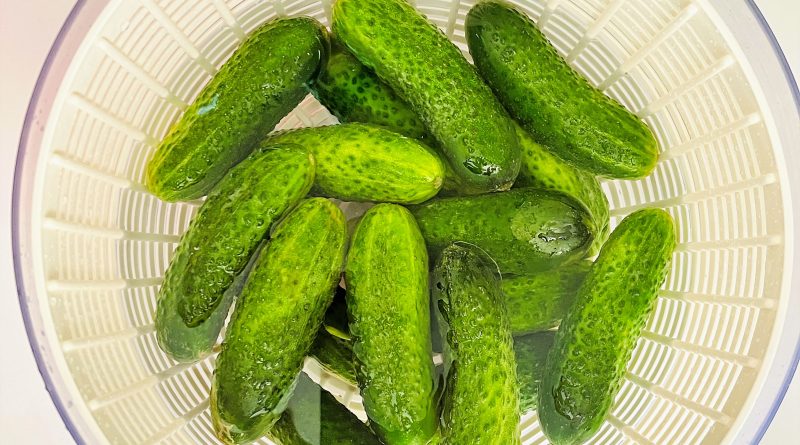
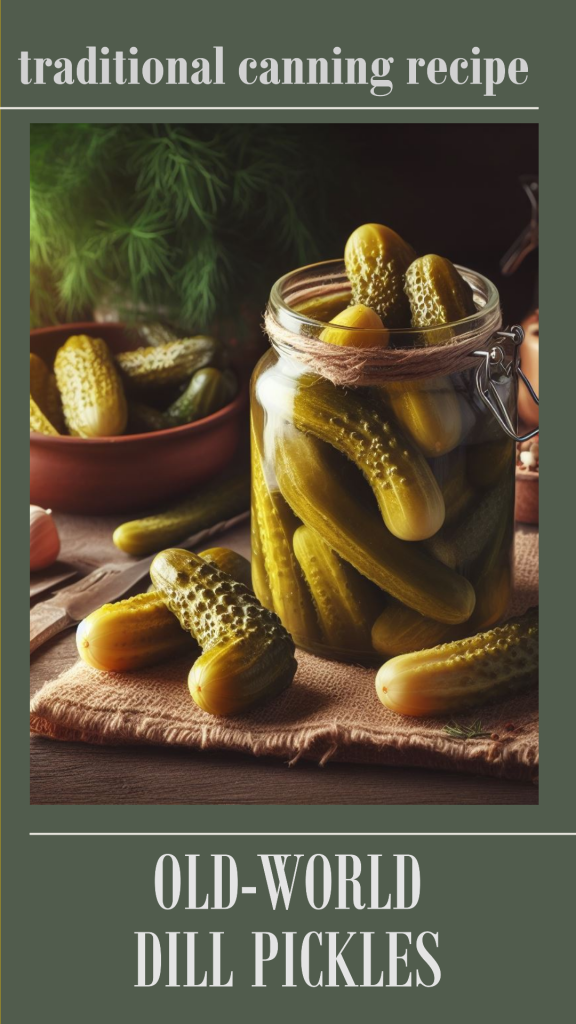

Leave a Reply